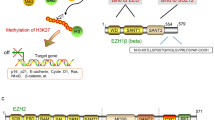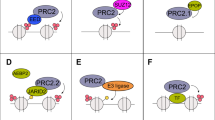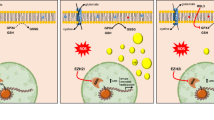Abstract
Polycomb protein histone methyltransferase enhancer of Zeste homologe 2 (EZH2) is frequently overexpressed in human malignancy and is implicated in cancer cell proliferation and invasion. However, it is largely unknown whether EZH2 has a role in modulating DNA damage response. Here, we show that EZH2 is an important determinant of cell fate decision in response to genotoxic stress. EZH2 depletion results in abrogation of both cell cycle G1 and G2/M checkpoints, directing DNA damage response toward predominant apoptosis in both p53-proficient and p53-deficient cancer cells, but not in normal cells. Mechanistically, EZH2 regulates DNA damage response in p53 wild-type cells mainly through transcriptional repression of FBXO32, which binds to and directs p21 for proteasome-mediated degradation, whereas it affects p53-deficient cells through regulating Chk1 activation by a distinct mechanism. Furthermore, pharmacological depletion of EZH2 phenocopies the effects of EZH2 knockdown on cell cycle checkpoints and apoptosis. These data unravel a crucial role of EZH2 in determining the cancer cell outcome following DNA damage and suggest that therapeutic targeting oncogenic EZH2 might serve as a strategy for improving conventional chemotherapy in a given malignancy.
Similar content being viewed by others
Log in or create a free account to read this content
Gain free access to this article, as well as selected content from this journal and more on nature.com
or
Abbreviations
- EZH2:
-
enhancer of Zeste homologe 2
- siRNA:
-
small interfering RNA
- ChIP:
-
chromatin immunoprecipitation
- H3K27me3:
-
H3 with trimethylated lysine 27
- DZNep:
-
deazaneplanocin A
- PARP:
-
poly (ADP-ribose) polymerase
- HEK293:
-
human embryonic kidney 293
References
Zhou BB, Elledge SJ . The DNA damage response: putting checkpoints in perspective. Nature 2000; 408: 433–439.
Sancar A, Lindsey-Boltz LA, Unsal-Kacmaz K, Linn S . Molecular mechanisms of mammalian DNA repair and the DNA damage checkpoints. Annu Rev Biochem 2004; 73: 39–85.
Fan S, Chang JK, Smith ML, Duba D, Fornace Jr AJ, O'Connor PM . Cells lacking CIP1/WAF1 genes exhibit preferential sensitivity to cisplatin and nitrogen mustard. Oncogene 1997; 14: 2127–2136.
Li J, Tan J, Zhuang L, Banerjee B, Yang X, Chau JF et al. Ribosomal protein S27-like, a p53-inducible modulator of cell fate in response to genotoxic stress. Cancer Res 2007; 67: 11317–11326.
Mukhopadhyay UK, Senderowicz AM, Ferbeyre G . RNA silencing of checkpoint regulators sensitizes p53-defective prostate cancer cells to chemotherapy while sparing normal cells. Cancer Res 2005; 65: 2872–2881.
Jascur T, Brickner H, Salles-Passador I, Barbier V, El Khissiin A, Smith B et al. Regulation of p21(WAF1/CIP1) stability by WISp39, a Hsp90 binding TPR protein. Mol Cell 2005; 17: 237–249.
Seoane J, Le HV, Massague J . Myc suppression of the p21(Cip1) Cdk inhibitor influences the outcome of the p53 response to DNA damage. Nature 2002; 419: 729–734.
Wouters BG, Giaccia AJ, Denko NC, Brown JM . Loss of p21Waf1/Cip1 sensitizes tumors to radiation by an apoptosis-independent mechanism. Cancer Res 1997; 57: 4703–4706.
Weiss RH . p21Waf1/Cip1 as a therapeutic target in breast and other cancers. Cancer Cell 2003; 4: 425–429.
Kawabe T . G2 checkpoint abrogators as anticancer drugs. Mol Cancer Ther 2004; 3: 513–519.
Graves PR, Yu L, Schwarz JK, Gales J, Sausville EA, O'Connor PM et al. The Chk1 protein kinase and the Cdc25C regulatory pathways are targets of the anticancer agent UCN-01. J Biol Chem 2000; 275: 5600–5605.
Tse AN, Schwartz GK . Potentiation of cytotoxicity of topoisomerase i poison by concurrent and sequential treatment with the checkpoint inhibitor UCN-01 involves disparate mechanisms resulting in either p53-independent clonogenic suppression or p53-dependent mitotic catastrophe. Cancer Res 2004; 64: 6635–6644.
Bunz F, Hwang PM, Torrance C, Waldman T, Zhang Y, Dillehay L et al. Disruption of p53 in human cancer cells alters the responses to therapeutic agents. J Clin Invest 1999; 104: 263–269.
Beuvink I, Boulay A, Fumagalli S, Zilbermann F, Ruetz S, O'Reilly T et al. The mTOR inhibitor RAD001 sensitizes tumor cells to DNA-damaged induced apoptosis through inhibition of p21 translation. Cell 2005; 120: 747–759.
Simon JA, Lange CA . Roles of the EZH2 histone methyltransferase in cancer epigenetics. Mutat Res 2008; 647: 21–29.
Bracken AP, Helin K . Polycomb group proteins: navigators of lineage pathways led astray in cancer. Nat Rev Cancer 2009; 9: 773–784.
Varambally S, Dhanasekaran SM, Zhou M, Barrette TR, Kumar-Sinha C, Sanda MG et al. The polycomb group protein EZH2 is involved in progression of prostate cancer. Nature 2002; 419: 624–629.
Cao R, Zhang Y . The functions of E(Z)/EZH2-mediated methylation of lysine 27 in histone H3. Curr Opin Genet Dev 2004; 14: 155–164.
Cao Q, Yu J, Dhanasekaran SM, Kim JH, Mani RS, Tomlins SA et al. Repression of E-cadherin by the polycomb group protein EZH2 in cancer. Oncogene 2008; 27: 7274–7284.
Fujii S, Ito K, Ito Y, Ochiai A . Enhancer of zeste homologue 2 (EZH2) down-regulates RUNX3 by increasing histone H3 methylation. J Biol Chem 2008; 283: 17324–17332.
Yang X, Karuturi RK, Sun F, Aau M, Yu K, Shao R et al. CDKN1C (p57) is a direct target of EZH2 and suppressed by multiple epigenetic mechanisms in breast cancer cells. PLoS One 2009; 4: e5011.
Bracken AP, Pasini D, Capra M, Prosperini E, Colli E, Helin K . EZH2 is downstream of the pRB-E2F pathway, essential for proliferation and amplified in cancer. Embo J 2003; 22: 5323–5335.
Chen H, Tu SW, Hsieh JT . Down-regulation of human DAB2IP gene expression mediated by polycomb Ezh2 complex and histone deacetylase in prostate cancer. J Biol Chem 2005; 280: 22437–22444.
Min J, Zaslavsky A, Fedele G, McLaughlin SK, Reczek EE, De Raedt T et al. An oncogene-tumor suppressor cascade drives metastatic prostate cancer by coordinately activating Ras and nuclear factor-kappaB. Nat Med 2010; 16: 286–294.
Kleer CG, Cao Q, Varambally S, Shen R, Ota I, Tomlins SA et al. EZH2 is a marker of aggressive breast cancer and promotes neoplastic transformation of breast epithelial cells. Proc Natl Acad Sci USA 2003; 100: 11606–11611.
Bracken AP, Kleine-Kohlbrecher D, Dietrich N, Pasini D, Gargiulo G, Beekman C et al. The Polycomb group proteins bind throughout the INK4A-ARF locus and are disassociated in senescent cells. Genes Dev 2007; 21: 525–530.
Yu J, Cao Q, Mehra R, Laxman B, Yu J, Tomlins SA et al. Integrative genomics analysis reveals silencing of beta-adrenergic signaling by polycomb in prostate cancer. Cancer Cell 2007; 12: 419–431.
Wu ZL, Zheng SS, Li ZM, Qiao YY, Aau MY, Yu Q . Polycomb protein EZH2 regulates E2F1-dependent apoptosis through epigenetically modulating Bim expression. Cell Death Differ 2009; 17: 801–810.
Rodriguez R, Meuth M . Chk1 and p21 cooperate to prevent apoptosis during DNA replication fork stress. Mol Biol Cell 2006; 17: 402–412.
Abbas T, Dutta A . p21 in cancer: intricate networks and multiple activities. Nat Rev Cancer 2009; 9: 400–414.
Ho MS, Tsai PI, Chien CT . F-box proteins: the key to protein degradation. J Biomed Sci 2006; 13: 181–191.
Hermand D . F-box proteins: more than baits for the SCF? Cell Div 2006; 1: 30.
Tan J, Yang X, Zhuang L, Jiang X, Chen W, Lee PL et al. Pharmacologic disruption of Polycomb-repressive complex 2-mediated gene repression selectively induces apoptosis in cancer cells. Genes Dev 2007; 21: 1050–1063.
Jariel-Encontre I, Bossis G, Piechaczyk M . Ubiquitin-independent degradation of proteins by the proteasome. Biochim Biophys Acta 2008; 1786: 153–177.
Chen X, Barton LF, Chi Y, Clurman BE, Roberts JM . Ubiquitin-independent degradation of cell-cycle inhibitors by the REGgamma proteasome. Mol Cell 2007; 26: 843–852.
Waldman T, Lengauer C, Kinzler KW, Vogelstein B . Uncoupling of S phase and mitosis induced by anticancer agents in cells lacking p21. Nature 1996; 381: 713–716.
Bunz F, Fauth C, Speicher MR, Dutriaux A, Sedivy JM, Kinzler KW et al. Targeted inactivation of p53 in human cells does not result in aneuploidy. Cancer Res 2002; 62: 1129–1133.
Lapenna S, Giordano A . Cell cycle kinases as therapeutic targets for cancer. Nat Rev Drug Discov 2009; 8: 547–566.
Bucher N, Britten CD . G2 checkpoint abrogation and checkpoint kinase-1 targeting in the treatment of cancer. Br J Cancer 2008; 98: 523–528.
Koniaras K, Cuddihy AR, Christopoulos H, Hogg A, O'Connell MJ . Inhibition of Chk1-dependent G2 DNA damage checkpoint radiosensitizes p53 mutant human cells. Oncogene 2001; 20: 7453–7463.
Zhou BB, Bartek J . Targeting the checkpoint kinases: chemosensitization versus chemoprotection. Nat Rev Cancer 2004; 4: 216–225.
Ashwell S, Zabludoff S . DNA damage detection and repair pathways--recent advances with inhibitors of checkpoint kinases in cancer therapy. Clin Cancer Res 2008; 14: 4032–4037.
Suva ML, Riggi N, Janiszewska M, Radovanovic I, Provero P, Stehle JC et al. EZH2 is essential for glioblastoma cancer stem cell maintenance. Cancer Res 2009; 69: 9211–9218.
Iliopoulos D, Lindahl-Allen M, Polytarchou C, Hirsch HA, Tsichlis PN, Struhl K . Loss of miR-200 inhibition of Suz12 leads to polycomb-mediated repression required for the formation and maintenance of cancer stem cells. Mol Cell 2010; 39: 761–772.
Viale A, De Franco F, Orleth A, Cambiaghi V, Giuliani V, Bossi D et al. Cell-cycle restriction limits DNA damage and maintains self-renewal of leukaemia stem cells. Nature 2009; 457: 51–56.
Dean M, Fojo T, Bates S . Tumour stem cells and drug resistance. Nat Rev Cancer 2005; 5: 275–284.
Kadota M, Yang HH, Gomez B, Sato M, Clifford RJ, Meerzaman D et al. Delineating genetic alterations for tumor progression in the MCF10A series of breast cancer cell lines. PLoS One 2010; 5: e9201.
Sheaff RJ, Singer JD, Swanger J, Smitherman M, Roberts JM, Clurman BE . Proteasomal turnover of p21Cip1 does not require p21Cip1 ubiquitination. Mol Cell 2000; 5: 403–410.
Jiang X, Tan J, Li J, Kivimae S, Yang X, Zhuang L et al. DACT3 is an epigenetic regulator of Wnt/beta-catenin signaling in colorectal cancer and is a therapeutic target of histone modifications. Cancer Cell 2008; 13: 529–541.
Santra MK, Wajapeyee N, Green MR . F-box protein FBXO31 mediates cyclin D1 degradation to induce G1 arrest after DNA damage. Nature 2009; 459: 722–725.
Acknowledgements
This work was supported by the Agency for Science, Technology and Research of Singapore. We thank the Singapore Tissue Network for providing the human samples. STL is supported by the NUS Graduate School for Integrative Sciences and Engineering (NGS) scholarship.
Author Contributions
ZW and QY conceived the work, designed the experiments and wrote the manuscript. ZW performed all the knockdown and phenotype analysis, with technical assistance from XJ, YJL and JT, CL for FACS analysis and western blot analysis. STL, YQ and PLL performed FBXO32 constructs and immunoprecipitation analysis. MA performed the array analysis and RT-PCR. ZL constructed FBXO32 overexpressing stable cell lines.
Author information
Authors and Affiliations
Corresponding author
Ethics declarations
Competing interests
The authors declare no conflict of interest.
Additional information
Edited by M Oren
Supplementary Information accompanies the paper on Cell Death and Differentiation website
Supplementary information
Rights and permissions
About this article
Cite this article
Wu, Z., Lee, S., Qiao, Y. et al. Polycomb protein EZH2 regulates cancer cell fate decision in response to DNA damage. Cell Death Differ 18, 1771–1779 (2011). https://doi.org/10.1038/cdd.2011.48
Received:
Revised:
Accepted:
Published:
Issue date:
DOI: https://doi.org/10.1038/cdd.2011.48
Keywords
This article is cited by
-
Methylation-dependent and -independent roles of EZH2 synergize in CDCA8 activation in prostate cancer
Oncogene (2022)
-
PRC2: an epigenetic multiprotein complex with a key role in the development of rhabdomyosarcoma carcinogenesis
Clinical Epigenetics (2021)
-
EZH2 has a non-catalytic and PRC2-independent role in stabilizing DDB2 to promote nucleotide excision repair
Oncogene (2020)
-
SETD2 mutations confer chemoresistance in acute myeloid leukemia partly through altered cell cycle checkpoints
Leukemia (2019)
-
EZH2 promotes DNA replication by stabilizing interaction of POLδ and PCNA via methylation-mediated PCNA trimerization
Epigenetics & Chromatin (2018)



